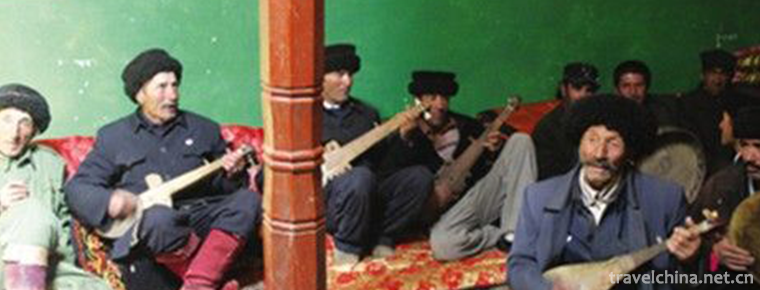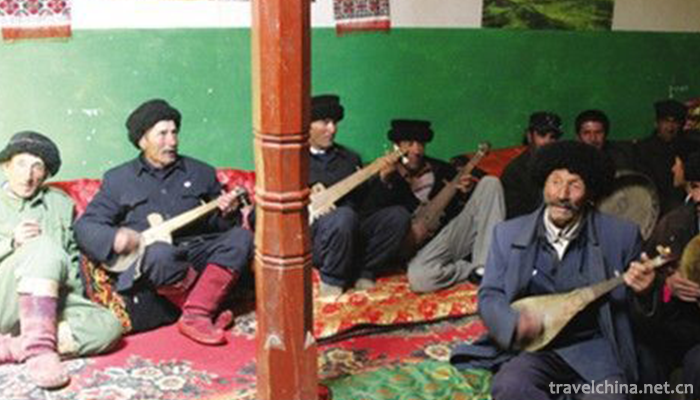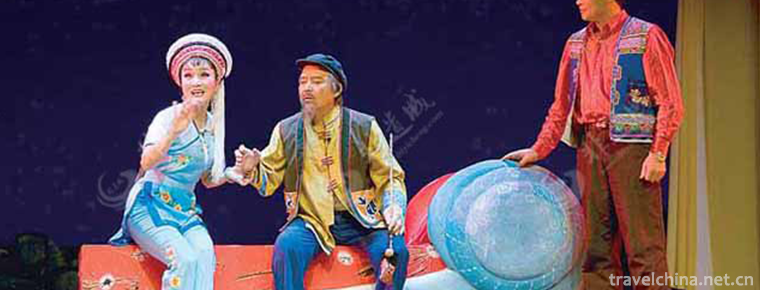2019-04-03

- By ChinaWiki.net
- Chinese Edition
- 2019-06-17
Tajik Folk Songs
Tajik folk songs are very rich in content. The folk songs handed down to this day include folk songs reflecting ancient social life, customs and customs, eulogizing love and religious rituals. The main types of folk songs are custom songs, love songs and narrative long poems. Each category has many categories. For example, folk songs include "story song", "history song", "labor song" and "new folk song".
On May 23, 2011, Tajik folk songs were listed in the third batch of national intangible cultural heritage list with the approval of the State Council.
historical origin
Among the Tajik people, there are rich and colorful oral literature, among which the unique folk songs are one. Folk songs are an important part of Tajik folk literature. As early as ancient times, the ancestors of Tajiks had their own totem worship and natural worship, which gradually evolved into their primitive religion. Although the Tajik people have not written down this history, as a folk song form of folk literature, these primitive religions, which have been difficult to trace, still faithfully record a side of the history of the Tajik people.
For a long time, ancient folk songs were regarded as pornographic songs (especially love folk songs) and were forbidden to sing. Later, new folk songs appeared, and the old ones were gradually forgotten. The people who can sing traditional folk songs are all over 50 years old. Few people can really sing the whole song. It is worrying that the ancient folk singers have no successors.
artistic characteristics
Many Tajik customs are songs, such as many folk songs at weddings. In Tajik marriage customs, the groom is likened to a king and the bride to a queen, which is respected by people. During the three-day wedding, they became "kings" and "queens". Servants brought them to dinner. They had to walk in the front and their parents could only follow them.
When the groom marries the bride, he will ride on a steed and come to the village with the welcoming party. The relatives and friends will play the eagle flute, drums and sing the old folk song "Shahman Amad". People praise the bride and groom, wish them happiness for ever, and wish all the loved ones in the world to be married.
Tajik marriage custom has also become an important cultural space for the inheritance of Tajik folk songs. Among Tajik folk songs, folk songs occupy a large part of the space. Love is the main content of folk songs. A large number of folk songs reflect the theme of love, such as "Jozi Mongjok" (a song to praise the beautiful girl) and "Spadrot" (a beautiful bird, has disappeared. Describe a girl as beautiful as a bird like that), "Greenjo" (sweet lover), "Dali Jane Gitt" (mother's good daughter), "Zainaleyn" (girl's name), "Gullipita" (a short beautiful flower, also named by a girl), "Oda Manitou" (I came to your house to see you). Love songs are rich in content, mainly reflecting the hot love between young men and women.
Each type of folk song has different content, especially in love folk song, its content is more abundant. Tajik nationality in China belongs to a branch of Tajik in the mountains. It is different from Tajik in the plains in terms of music and maintains a simple and unique style. From the perspective of genre and function, Tajik folk songs include some dancing folk songs. Therefore, the rhythm and tune of Tajik folk songs also have different changes. In the rhythm, there are not only fast-paced folk songs such as 5/8, 6/8, but also slow-paced folk songs such as Gulibita. According to the contents and tunes of different folk songs, people dance with the accompaniment of Eagle flute, drum and hot wafu.
Tajik traditional folk songs are mainly sung in the form of multi-person singing or solo singing. They can be sung with or without accompaniment.
Representative Works
Gulibita is a love song that everyone of Tajik nationality can sing. This ancient song later became the theme song of the movie Why the Flowers Are so Red and became popular all over the country. Nahonruzi Tulson sang the original words in Tajik: "Don't be angry, Beauty. I bring the light of Bukhara. I am the bright moon. I have visited Bukhara and Kabulstan, and I want to scatter my valuable belongings for Gullipita. The beauty of Gulibita is better than the petals of a hundred flowers, and the hymns can't be finished.
Inheritance Significance
Tajik people love their folk songs very much, folk songs are part of their lives.
When you come to the Tajik family, the enthusiastic host after tea and dinner will entertain the guests with singing and enjoy the guests. If you attend a wedding, you can also enjoy beautiful songs and beautiful dances, that is, to attend funerals, you can also hear moving farewell songs.
Tajik folk song is a song in heaven. People express their joy, anger and sorrow by singing, express their ideal by singing, and narrate and record their history by singing. The song in the sky is always rippling in the clouds, so beautiful, so desirable.

Ask a Question
Your email address will not be published.



0 Questions